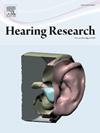单核细胞依赖性先天免疫可预防小鼠中耳急性细菌感染的严重并发症
IF 2.5
2区 医学
Q1 AUDIOLOGY & SPEECH-LANGUAGE PATHOLOGY
引用次数: 0
摘要
急性中耳炎是一种常见的中耳感染。免疫细胞,特别是单核细胞在预防AOM并发症中的作用尚不清楚。因此,本研究旨在通过小鼠模型研究单核细胞在细菌AOM免疫应答中的作用。方法采用gfp标记的铜绿假单胞菌(Pseudomonas aeruginosa, PA01)中耳注射感染野生型C57BL/6小鼠,模拟细菌性AOM。使用氯膦酸脂质体进行单核细胞消耗(MD)。结果MD组注射PA01 IT后的存活率(50.0%,n = 18)明显低于对照组(100%,n = 9), p = 0.018。注射PA01后2周,MD组出现严重的听力损失,而对照组在注射后2周出现短暂性听力损失消退。MD组细菌生长明显高于对照组(p <;0.001)。结论md引起细菌生长失控,并发症严重。单核细胞介导的免疫反应在预防AOM的严重并发症中起关键作用,提示未来治疗策略的潜在靶点。本文章由计算机程序翻译,如有差异,请以英文原文为准。
Monocyte-dependent innate immunity prevents severe complications of acute bacterial infection in the middle ear in a murine model
Introduction
Acute otitis media (AOM) is a common middle ear infection. The role of immune cells, particularly monocytes, in preventing complications of AOM remains unclear. Therefore, this study aimed to investigate the role of monocytes in immune response to bacterial AOM using a murine model.
Methods
Wild-type C57BL/6 mice were infected with GFP-tagged Pseudomonas aeruginosa (PA01) via intratympanic (IT) middle ear injection to mimic bacterial AOM. Monocyte depletion (MD) was performed using clodronate liposomes.
Results
The survival rate after PA01 IT injection was significantly lower (p = 0.018) in the MD group (50.0 %, n = 18) than in the control group (100 %, n = 9). The MD group exhibited severe hearing loss 2 weeks after PA01 injection, whereas the control group showed transient hearing loss resolving by 2 weeks. Bacterial growth was significantly greater in the MD group than in the control group (p < 0.001).
Conclusion
MD causes uncontrolled bacterial growth and leads to more severe complications. Monocyte-mediated immune responses play a critical role in preventing the severe complications of AOM, suggesting a potential target for future therapeutic strategies.
求助全文
通过发布文献求助,成功后即可免费获取论文全文。
去求助
来源期刊

Hearing Research
医学-耳鼻喉科学
CiteScore
5.30
自引率
14.30%
发文量
163
审稿时长
75 days
期刊介绍:
The aim of the journal is to provide a forum for papers concerned with basic peripheral and central auditory mechanisms. Emphasis is on experimental and clinical studies, but theoretical and methodological papers will also be considered. The journal publishes original research papers, review and mini- review articles, rapid communications, method/protocol and perspective articles.
Papers submitted should deal with auditory anatomy, physiology, psychophysics, imaging, modeling and behavioural studies in animals and humans, as well as hearing aids and cochlear implants. Papers dealing with the vestibular system are also considered for publication. Papers on comparative aspects of hearing and on effects of drugs and environmental contaminants on hearing function will also be considered. Clinical papers will be accepted when they contribute to the understanding of normal and pathological hearing functions.
 求助内容:
求助内容: 应助结果提醒方式:
应助结果提醒方式:


